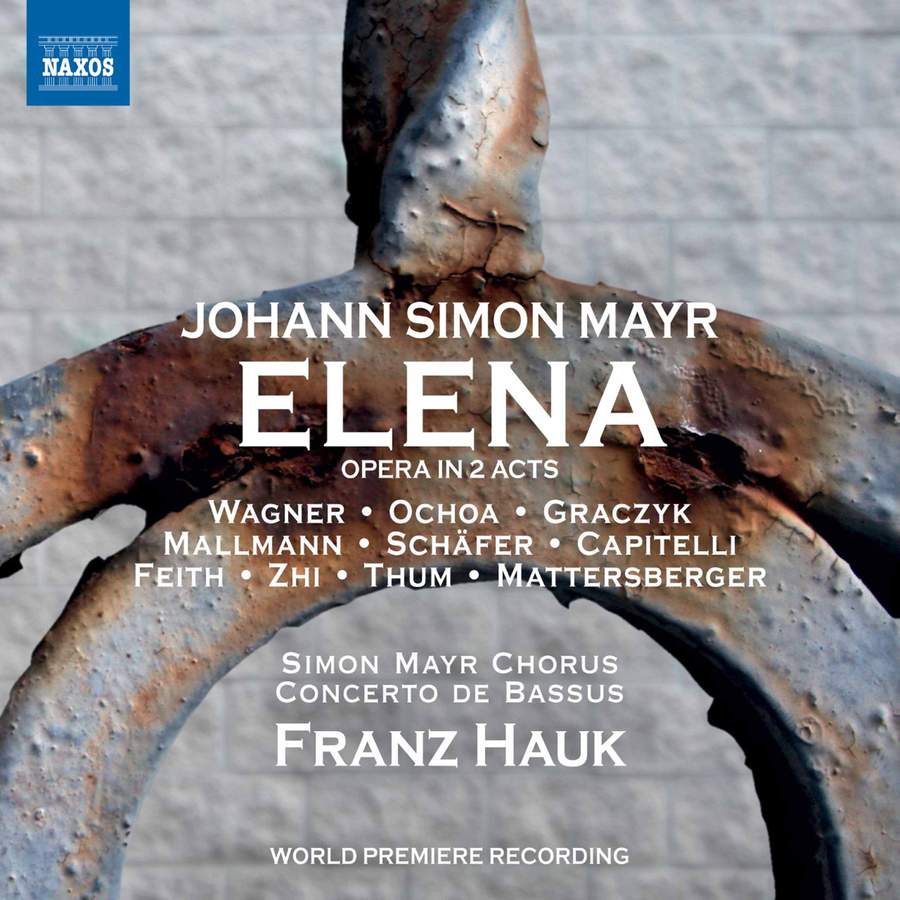MAYR Elena (Hauk)
View record and artist detailsRecord and Artist Details
Genre:
Opera
Label: Naxos
Magazine Review Date: 10/2021
Media Format: CD or Download
Media Runtime: 151
Mastering:
DDD
Catalogue Number: 8 660462-63

Tracks:
| Composition | Artist Credit |
|---|---|
| Elena (e Costantino) |
(Johannes) Simon Mayr, Composer
Andreas Mattersberger, Duke of Urbino, Bass Anna Feith, Ernesta, Soprano Anna-Doris Capitelli, Anna, Mezzo soprano Concerto de Bassus Daniel Ochoa, Costantino, Bass Fang Zhi, Governor, Tenor Franz Hauk, Conductor Harald Thum, Herald, Tenor Julia Sophie Wagner, Elena/Riccardo, Soprano Markus Schäfer, Edmondo, Tenor Mira Graczyk, Paolino/Adolfo, Soprano Niklas Mallmann, Carlo, Bass Simon Mayr Chorus |
Author: Richard Wigmore
‘Un morceau de génie’ was Stendhal’s verdict on Elena, triumphantly premiered in Naples in January 1814. Like Fidelio, whose final version was premiered a few months later, Simon Mayr’s dramma eroicomico has roots in the French Revolutionary ‘rescue’ opera. Duke Costantino of Arles, falsely accused of murdering his own father, was usurped by the treacherous Romualdo and is now a fugitive. He has been separated from his wife Elena, who initially appears in male disguise, and their son Paolino. At the climax of the action both face death. Here, though, any similarities with Fidelio end. Following contemporary Neapolitan taste, Andrea Tottola’s libretto infuses a heroic – and convoluted – opera seria plot with buffo comedy. The Provençal setting provides a cue for rustic songs and choruses. All ends happily, of course, with a last-minute revelation of the truth by Romualdo’s vacillating son Edmondo.
An Italianised Bavarian, Mayr was a skilled and (by 1814) vastly experienced operatic professional. The music of Elena is carefully crafted in an idiom somewhere between the Mozart of the da Ponte operas, Cherubini and Rossini. The dramatic temperature occasionally rises. There is a fine build-up of tension in the climactic Sextet and chorus in which Costantino protests his innocence before the baying crowd – a number singled out in early reviews. But as in other Mayr operas I’ve heard, time and again the invention sounds simply too amiable for the desperate situations in which the characters find themselves. Jauntiness and jollity keep breaking in, often courtesy of tootling wind solos that tickle the ear without raising the pulse rate. Comic and serious characters are often barely differentiated in their music. Mayr’s colourful, Mozart-influenced writing for woodwind and horns was rightly admired by Rossini and others. But whereas Mozart uses woodwind in the service of the drama, Mayr’s frequent sallies for flutes, oboes and clarinets are merely decorative.
While few would echo Stendhal’s judgement today, Mayr’s polished, unfailingly euphonious score can still give pleasure in a sympathetic, finely recorded performance such as this. Franz Hauk, who has done more for Mayr’s music than anyone bar the composer himself, gets vivid playing from his expert period band, not least the tangy woodwind. If recitatives, accompanied by harpsichord and (dubiously) double bass, could flow more naturally, tempos in the arias and ensembles are aptly chosen. The cast, too, is a strong one. In the lead roles, the accomplished lyric-coloratura Julia Sophie Wagner and the resonant yet agile bass-baritone of Daniel Ochoa rise impressively to Mayr’s virtuoso demands. Ochoa does his best to inject tension into his potentially distraught Act 2 scena where pirouetting clarinet and flute seem intent on diffusing it.
In the buffo role of the cheery farmer Carlo, Niklas Mallmann sings well enough while lacking an authentic Italianate bite and brio. Markus Schäfer, as Edmondo, if rather dry of tone, acts well with the voice and always uses the text effectively. Among the smaller parts, the sweet-voiced Mira Graczyk, as the boy Paolino, combines charmingly with Julia Sophie Wagner in a pretty Romanze. As Carlo’s daughter, mezzo Anna-Doris Capitelli sings her comic aria with spirit, relishing her words like a true Italian. Fang Zhi fields a mellifluous lyric tenor as the Governor; and it is hardly his fault that the would-be severity of his aria is undermined by breezy march rhythms. The chorus make their mark in the attractive bucolic episodes. As in earlier offerings in Naxos’s Mayr series, there is an informative booklet essay plus a track-by-track synopsis but no libretto. For this you’ll have to go online, where you’ll find the original Italian plus a German – but frustratingly no English – translation.
Discover the world's largest classical music catalogue with Presto Music.

Gramophone Digital Club
- Digital Edition
- Digital Archive
- Reviews Database
- Full website access
From £8.75 / month
Subscribe
Gramophone Full Club
- Print Edition
- Digital Edition
- Digital Archive
- Reviews Database
- Full website access
From £11.00 / month
Subscribe
If you are a library, university or other organisation that would be interested in an institutional subscription to Gramophone please click here for further information.




